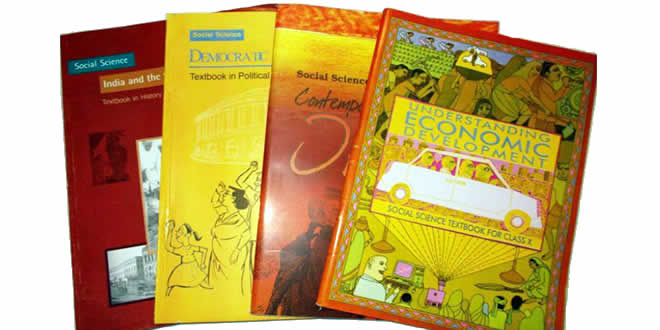CBSE Class 10 Social Science Syllabus 2024: The syllabus consists of four units: (i) India and the Contemporary World (ii) Contemporary India (iii) Democratic Politics (iv) Understanding Economic Development.
Exam Structure: CBSE Class 10 Social Science Syllabus 2024
| # | Unit | Marks |
| I | India and the Contemporary World – II | 20 |
| II | Contemporary India – II | 20 |
| III | Democratic Politics – II | 20 |
| IV | Understanding Economic Development | 20 |
| Total | 80 |
Unit 1: India and the Contemporary World – II
Section 1: Events and Processes
1. The Rise of Nationalism in Europe
- Infer how the French Revolution had an impact on the European countries in the making of nation state.
- Enumerate and evaluate the validity of the nature of the diverse social movements of the time.
- Analyse and infer how the idea of nationalism emerged and led to the formation of nation states in Europe and elsewhere.
- Illustrate that the quest for imperialism triggered the First World War.
2. Nationalism in India
- Illustrate various facets of Nationalistic movements that ushered in the sense of Collective Belonging
- Summarize the aspects of the First World War that triggered two defining movements (Khilafat & Non-cooperation Movement) in India.
- Evaluate the effectiveness of the strategies applied by Gandhiji and other leaders in the Two movements.
Section 2: Livelihoods, Economies and Societies
3. The Making of a Global World
To be evaluated in the Board Examination – Subtopics: 1 to 1.3 Pre Modern World to Conquest, Disease and Trade
- Summarize the changes that transformed the world in terms of economy, political, cultural and technological areas.
- Depict the global interconnectedness from the Pre modern to the present day.
- Enumerate the destructive impact of colonialism on the livelihoods of colonised people.
4. The Age of Industrialization
To be assessed as part of Periodic Assessments only
Section 3: Everyday Life, Culture and Politics
5. Print Culture and the Modern World
- Enumerate the development of Print from its beginnings in East Asia to its expansion in Europe and India.
- Comment on the statement that the print revolution was not just a way of producing book but profound transformation of people.
- Compare and contrast the old tradition of hand written manuscripts versus the print technology.
- Summarise the role of Print revolution and its impact on World & India ’s political, social and economic condition.
Unit 2: Contemporary India – II – CBSE Class 10 Social Science Syllabus
1. Resources and Development
- Enumerates how the resources are interdependent, justify how planning is essential judicious utilization of resources and the need to develop them in India
- Infers the rationale for development of resources
- Analyse and evaluate data and information related to nonoptimal land, utilization in India
- Appraise and infer the need to conserve all resources available in India suggest remedial measures for optimal utilization of underutilized resources
2. Forest and Wildlife Resources
- Enumerate how conservation of forests and wildlife are interdependent in nature and in maintain the ecology of India.
- Analyse and infer how some of the developmental works, grazing wood cutting have impacted on the survival or otherwise of the forests.
- Summarizes the reasons for conservation of biodiversity in India under sustainable development.
3. Water Resources
- Enumerate why the water resource of India to be conserved.
- Summarize the roles of Multipurpose projects in supporting the water requirement of India.
4. Agriculture
- Enumerate how agriculture plays a contributory role in Indian economy
- Analyses and infers the challenges faced by the farming community in India
- Identifies and summarizes various aspects of agriculture, including crop production, types of farming, modern agricultural practices, and the impact of agriculture on the environment.
5. Minerals and Energy Resources
- Analyses and infers how different types of minerals are formed, where they are found, their uses, importance for human life and the economy
- Infers the resource distribution to real-world situations and proposes strategies for sustainable use of natural resources
- Differentiates between the conventional and nonconventional sources of energy.
6. Manufacturing Industries
- Differentiates between various types of manufacturing industries based on their input materials, processes, and end products, and analyse their significance in the Indian economy.
- Enumerates the impact of manufacturing industries on the environment, and develop strategies for sustainable development of the manufacturing sector.
- Infers the relation between availability of raw material and location of the Industry.
7. Life Lines of National Economy
Only map pointing to be evaluated in the Board Examination
Interdisciplinary project as part of multiple assessments (Internally assessed for 5 marks)
Unit 3: Democratic Politics – II – CBSE Class 10 Social Science Syllabus
1. Power Sharing
- Enumerate the need for power sharing in democracy.
- Analyse and infer the challenges faced by Belgium and Sri Lanka in ensuring Power sharing.
- Compare and contrast the power sharing of India with Sri Lanka and Belgium.
- Summarize the purpose of power sharing in preserving the unity and stability of a country.
2. Federalism
- Analyse and infer how federalism is being practised in India.
- Analyse and infer how the policies and politics that has strengthens federalism in practice.
3. Gender, Religion and Caste
- Enumerates how the differences in gender, religion and caste impact the practicing healthy or otherwise in a Democracy.
- Analyses and infers how different expressions based on the differences in Gender, Religion and Caste are healthy or unhealthy in a democracy.
4. Political Parties
- Enumerates the role, purpose, and no. of Political Parties in Democracy.
- Justifies the contributions /non contributions made by national and regional political parties in successful functioning of Indian democracy.
5. Outcomes of Democracy
- Enumerates how a success of democracy depends on quality of government, economic wellbeing, in equality, social differences, conflict, freedom and dignity.
- Analyses and infers why sometimes the gap occurs between expected outcome and actual outcome effects the success of Democracy.
Unit 4: Understanding Economic Development – CBSE Class 10 Social Science Syllabus
1. Development
- Enumerate different and examine the different processes involved in setting developmental Goals that helps in nation building
- Analyse and infer how the per capita income depicts the economic condition of the nation.
- Evaluate the development goals that have been set for the nation by the Planning commission of India -with specific reference to their efficacy, implemental strategies, relevance to current requirements of the nation
- Compare and contrast how the per capita income of some countries and infer reasons for the variance
- Analyses the multiple perspectives on the need development.
2. Sectors of the Indian Economy
- Analyses and infer how the economic activities in different sectors contribute to the overall growth and development of the Indian economy.
- Propose solutions to identified problems in different sectors based on their understanding
- Summarize how the organised and unorganised sectors are providing employment and the challenges faced by them
- Enumerates the role of unorganised sector in impacting PCI currently and proposes suggestive steps to reduce the unorganised sector for more productive contributions to GDP
- Enumerates and infer the essential role of the Public and Private sectors the present trends of PPP and efficacy of the initiative
3. Money and Credit
- Enumerate how money plays as a medium exchange in all transactions of goods and services since ancient times to the present times
- Analyse and infer various sources of Credit
- Summarizes the significance and role of self-help groups in the betterment of the economic condition of rural people/ women.
4. Globalization and the Indian Economy
To be evaluated in the Board Examination:
- What is Globalization?
- Factors that have enabled Globalisation
- Enumerate the concept of globalization and its definition, evolution, and impact on the global economy.
- Evaluate the key role of the key major drivers of globalization and their role in shaping the global economic landscape in various countries
- Enumerates the significance of role of G20 and its significance in the light of India’s present role
 Class Notes NCERT Solutions for CBSE Students
Class Notes NCERT Solutions for CBSE Students







